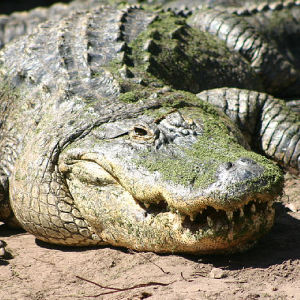
|
Class:
|
Reptilia
|
|
Order:
|
Crocadylia
|
|
Family:
|
Alligatoridae
|
|
Genus:
|
Alligator
|
|
Species:
|
mississippiensis
|
|
Life span:
|
Up to 50 years in the wild
80 years under human care |
|
Egg Gestation:
|
Females make a nest and lay from 20 – 50 eggs. Each egg weighs 2 –3 oz each. Hatching occurs after 65 days of incubation.
|
|
Number of young at birth:
|
20 – 50
|
|
Age of maturity:
|
10 – 12 years
|
|
Size:
|
Females 10 – 12 ft
Males: 3 – 15 ft |
|
Weight:
|
Up to 900 lb
|
|
Size at birth:
|
9 – 10 in.
|
| Habitat: | Wetlands |
| Range: | southeastern United States |
Fun Facts:
-
Small alligators hatchling eat insects, crabs, crayfish, small fish, frogs, snails and many other small prey. Larger alligators eat fish, turtles, mammals, snakes, crabs, crayfish, birds, insects and other alligators.
-
If the temperature drops below 86˚F, all eggs will turn out to be female alligators. If the temperature rises to 93˚F or above, all eggs will turn out to be male. At 89.6˚F, more than ¾ of the hatchlings are female.
-
The nest is made of mounds of vegetation and mud that can rise 3.5 ft and twice as wide.
-
The American Alligator can only withstand brackish water for short periods of time.
-
Can tolerate colder temperatures than crocodiles
-
They are the largest reptile in North America.
-
Can go through 2,000 to 3,000 teeth in a lifetime.











